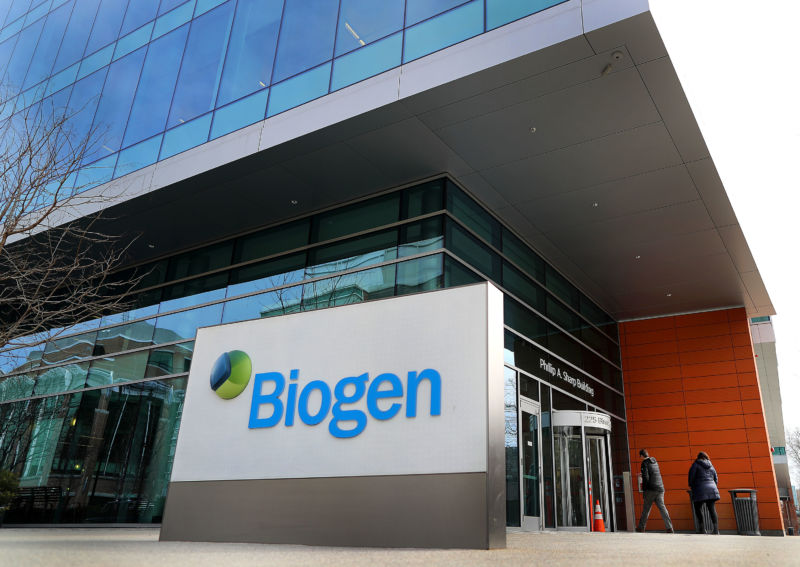
Enlarge/The exterior of the headquarters of biotechnology company Biogen in Cambridge, Massachusetts.
An experimental treatment for Alzheimer’s disease isheaded to the Food and Drug Administration for approval– despite the fact that it flunked a “futility analysis” and was abandoned by its maker just months ago.
In March, biotech company Biogen halted two Phase III clinical trials of the antibody drugaducanumabafter the analysis of preliminary data suggested it was destined for failure. The decision to ditch the closely watched drug sent Biogen’s future and stock into a tailspin. Shares fell more than 25% the day ofthe announcement, slashingabout $ 18 billion from the company’s market value, according to Bloomberg at the time.
But that March decision was based on data collected only through December 2018. Additional data from those intervening months kept rolling in — and it told a different story, according to Biogen.
Those who received higher doses of aducanumab “experienced significant benefits on measures of cognition and function such as memory, orientation, and language, “the company reported. Those patients also saw benefits in daily activities, such as while they were managing their personal finances, cleaning, doing laundry, shopping, and traveling outside their homes.
In a statement, Biogen’s Chief Executive Officer, Michel Vounatsos, said:
With such a devastating disease that affects tens of millions worldwide, today announcement is truly heartening in the fight against Alzheimer’s. This is the result of groundbreaking research and is a testament to Biogen’s steadfast determination to follow the science and do the right thing for patients. We are hopeful about the prospect of offering patients the first therapy to reduce the clinical decline of Alzheimer’s disease and the potential implication of these results for similar approaches targeting amyloid beta.
Biogen said it expects to submit the drug for FDA approval in early 2020. The news sent Biogen’s stocksoaring 42%early Tuesday, putting it back where it was before the March crash.
So what changed?
Biogen says its reversal of fortune came down to more data on patients who were given high doses of aducanumab. That data came from two separate trials, dubbed EMERGE (which enrolled 1, 638 patients) and ENGAGE (which included 1, (patients). Both were Phase III multicenter, randomized, double-blind, placebo-controlled, parallel-group studies testing the safety and efficacy of 18 – month regimens of aducanumab at two different doses.
Before these trials began, research suggested that aducanumab can clear out the hallmark clumps of goopy amyloid-beta peptides that accumulate in the brains of Alzheimer’s patients. But clearing out those clumps from blood vessels in the brain comes with the potential risk of damaging the vessels, which could trigger immune responses and swelling.
As Ars reported in 2016, results of a Phase I trial seemed to confirm this risk. Though the drug cleared out the clumps, the higher the dose of aducanumab in the trial, the more signs of brain swelling and hemorrhaging — which show up as ARIA-E, or amyloid-related imaging abnormalities-edema.
That Phase I trial started with 165 participants, 32 of which received the higher dose. Of those, 15 developed ARIA-E, and 10 patients dropped out of the study because of adverse events, a troubling sign.
Phase III
The problem persisted in the two Phase III trials. ARIA-E and headaches were the most commonly reported side effects in both, and the early data was mostly from lower-dose patients, who are less likely to develop ARIA-E.
When Biogen conducted the futility analysis in March, the company had data from just 1, 748 patients who completed the full 18 – month experimental treatment. As data continued to roll in, Biogen gathered data on 318 more patients who completed the 18 -month treatment. That’s a total of 2, (patients) 63%) who completed the treatment of the 3, 285 patients initially included in the two trials. It’s unclear how many of the remaining 37% of patients dropped out due to adverse events.
Nevertheless, the additional data had more results from patients given the higher dose. Together, they tipped the scales to show that those higher doses led to a “significant reduction of clinical decline from baseline.” The results were only statistically significant for one of the two studies (EMERGE, not ENGAGE), though.
The company says it has been in discussions with the FDA about submitting the drug for approval.
There are currently no approved therapies that can reduce the effects of Alzheimer’s, which affects around 5 million Americans. Any new treatment that hits the market is expected to earnbillions of dollars in sales, according to Reuters.







GIPHY App Key not set. Please check settings